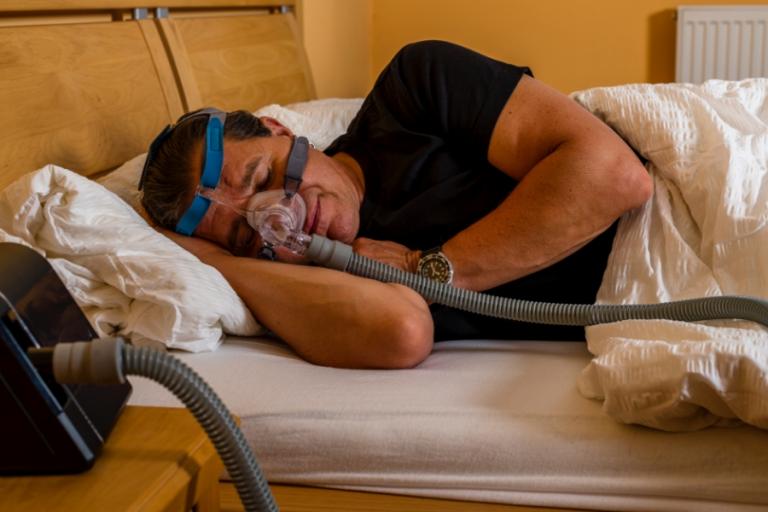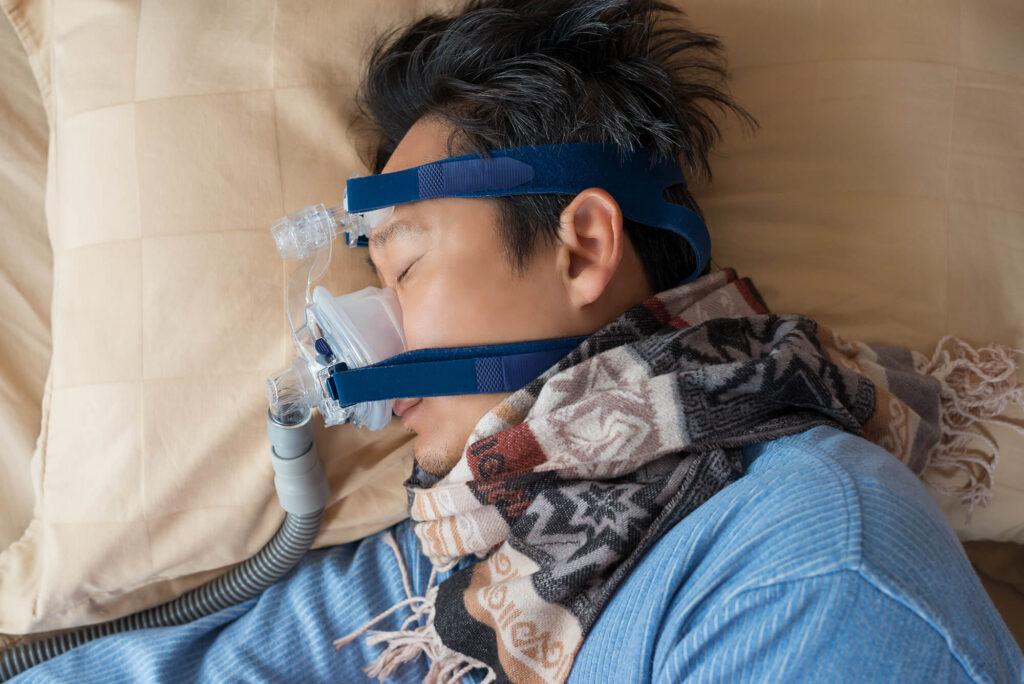Sleep is supposed to be restorative — a time when your body repairs and your mind recharges. But for millions of people worldwide, that rest is constantly interrupted by an invisible and dangerous condition called sleep apnea. What many don’t realize is that this common sleep disorder does more than just cause fatigue and loud snoring — it can also put your heart health at serious risk.
In this article, we’ll explore the link between sleep apnea and heart disease, why early detection is crucial, and how modern sleep apnea treatments such as CPAP therapy can protect your cardiovascular health.
What Is Sleep Apnea? A Silent Sleep Disruptor
Sleep apnea is a sleep disorder where breathing repeatedly stops and starts during sleep. These pauses in breathing can last from a few seconds to nearly a minute and may happen dozens or even hundreds of times per night.
There are three main types:
- Obstructive Sleep Apnea (OSA): The most common type, caused by airway blockage due to relaxed throat muscles.
- Central Sleep Apnea: Occurs when the brain fails to send proper signals to the muscles that control breathing.
- Complex Sleep Apnea: A combination of both obstructive and central forms.
Each episode reduces oxygen levels in the blood, forcing your body to jolt awake briefly to resume breathing. This constant interruption prevents you from reaching the deep, restorative stages of sleep your body needs.
See more: Understanding Oxygen Therapy at Home: A Practical Guide
The Hidden Connection Between Sleep Apnea and Heart Disease
Medical research has revealed a strong link between sleep apnea and cardiovascular disease. According to the American Heart Association, untreated sleep apnea significantly increases the risk of high blood pressure, irregular heartbeats, stroke, and heart failure.
1. Oxygen Deprivation and Heart Strain
Every time your breathing stops, oxygen levels drop — a condition known as intermittent hypoxia. This triggers a stress response that causes your heart rate and blood pressure to spike. Over time, these repeated surges put chronic strain on your heart, leading to hypertension and structural heart changes.
2. Inflammation and Blood Vessel Damage
Sleep apnea also increases systemic inflammation, which damages the inner lining of blood vessels (the endothelium). Damaged vessels are more likely to accumulate plaque, contributing to atherosclerosis — a major risk factor for heart attacks and strokes.
3. Irregular Heart Rhythms
People with untreated sleep apnea are more prone to arrhythmias, such as atrial fibrillation (AFib). These irregular heartbeats can increase the likelihood of blood clots, leading to stroke or other cardiovascular complications.
Real-World Example: When Poor Sleep Becomes a Cardiac Crisis
Consider Mark, a 52-year-old accountant who experienced chronic fatigue, loud snoring, and frequent nighttime awakenings. Ignoring his symptoms, he later suffered a mild heart attack. During his hospital stay, a sleep study revealed that he had severe obstructive sleep apnea.
Once he began using a CPAP machine — a device that provides continuous air pressure to keep airways open — his sleep improved dramatically, and his blood pressure stabilized. Mark’s story mirrors many others who unknowingly risk their heart health due to undiagnosed sleep apnea.
What Research Says About Sleep Apnea and Heart Health
Several sleep studies have demonstrated this connection:
- A 2021 study published in the Journal of Clinical Sleep Medicine found that 50% of people with heart failure also suffer from sleep apnea.
- Another study in the European Heart Journal revealed that untreated sleep apnea increases the risk of fatal cardiovascular events by up to 140%.
- Regular CPAP therapy users saw a drop in blood pressure and improved oxygen saturation, significantly lowering their risk of heart disease.
These findings reinforce the need for early diagnosis and treatment — not just for better sleep, but for long-term heart protection.

Symptoms of Sleep Apnea You Shouldn’t Ignore
Many people dismiss the signs of sleep apnea as simple snoring or tiredness, but the symptoms can be warning signs of something much more serious.
Watch for these red flags:
- Loud, chronic snoring
- Gasping or choking during sleep
- Excessive daytime sleepiness
- Morning headaches
- Poor concentration or memory issues
- Irritability and mood swings
- Waking with a dry mouth or sore throat
If you or your partner notice these symptoms, it’s time to schedule a sleep study with a sleep specialist.
How CPAP Therapy Protects Your Heart
Continuous Positive Airway Pressure (CPAP) therapy is considered the gold standard for sleep apnea treatment. It works by delivering a steady stream of air through a mask, keeping your airways open during sleep.
Benefits of CPAP Therapy:
- Maintains consistent oxygen levels
- Reduces nighttime awakenings
- Lowers blood pressure and heart strain
- Improves daytime energy and mood
- Helps regulate heart rhythm and oxygen delivery
Studies show that patients who adhere to CPAP therapy for at least 4 hours per night experience significant improvements in cardiovascular health.
Other Effective Sleep Apnea Treatments
While CPAP therapy is highly effective, it’s not the only solution. Depending on the severity of your condition, doctors may recommend:
1. Lifestyle Changes
- Weight management: Losing even 10% of body weight can reduce apnea severity.
- Avoiding alcohol and sedatives: These relax throat muscles and worsen airway blockage.
- Sleep position training: Sleeping on your side prevents airway collapse.
- Regular exercise: Enhances oxygen use and overall heart function.
2. Oral Appliances
Dentists can prescribe custom oral devices that reposition the jaw and tongue to keep airways open. These are especially helpful for people with mild to moderate sleep apnea.
3. Surgical Interventions
In severe cases, procedures such as uvulopalatopharyngoplasty (UPPP) or upper airway stimulation therapy can help reduce tissue obstruction.
Why Early Diagnosis Saves Lives
The earlier sleep apnea is diagnosed, the better your chance of preventing long-term complications like hypertension, stroke, and heart disease.
A home sleep study or an in-lab polysomnography can accurately detect breathing interruptions and oxygen levels, helping your doctor design a personalized treatment plan.
Protecting Both Sleep and Heart Health
Good sleep is more than a luxury — it’s a necessity for a healthy heart. If you’re struggling with chronic fatigue, snoring, or interrupted sleep, don’t wait for symptoms to worsen. Treating sleep apnea not only restores your sleep quality but can also safeguard your heart health for years to come.
✅ Key Takeaways:
- Sleep apnea and heart disease are closely linked through oxygen deprivation, inflammation, and high blood pressure.
- CPAP therapy and lifestyle changes can dramatically reduce cardiovascular risks.
- Early diagnosis through a sleep study is essential for effective treatment.
- Protecting your sleep means protecting your heart.
FAQS
Sleep apnea causes repeated drops in oxygen levels during sleep, forcing the heart to work harder. Over time, this can lead to high blood pressure, irregular heartbeats, heart attacks, and even heart failure. Treating sleep apnea early significantly lowers cardiovascular risks.
Yes. Research shows that managing sleep apnea — especially through consistent CPAP therapy — reduces strain on the heart, lowers blood pressure, and improves circulation. Patients who treat their sleep apnea often experience better heart function and overall cardiovascular health.
No. While CPAP therapy is the most effective for moderate to severe cases, lifestyle changes such as losing weight, avoiding alcohol, sleeping on your side, and using oral appliances can help manage mild sleep apnea and support heart health.
Men over 40, individuals who are overweight, smoke, or have high blood pressure are at higher risk. However, women and younger adults can also develop both conditions — especially if they experience chronic snoring or daytime fatigue.

